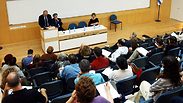
Israeli academia is not accepting of the other
Op-ed: When academic conference held under banner of 'Accepting the Other' only has Ashkenazi participants, it's not rejection - it's a disgrace.
Every civilized society, at any point in time, is in need of self-examination over manifestations of hatred, incitement and exclusion within it. "The other," regardless of who that is, is worthy of acceptance (as long as he wants to be accepted, and that isn't always the case). Not in order to be discussed, not in order to provide for academic chairs and researchers who will receive funds on his behalf.
The other is worthy of acceptance as a partner, not only as an image one looks at through an academic microscope.
The other will be perpetuated as "the other" as long as he remains solely an object of research. Because the other usually wants to be a partner. He wants to be not only part of the labor market, but also part of the elite. In fact, he usually doesn't want to be "the other," but there are those who take the trouble to leave him out. Sometimes unintentionally; sometimes willfully.
When all of the Bank of Israel's bills feature Ashkenazi figures, the state is nurturing the rejection of the other. It's a symbolic matter. But symbols are part of the issue. And when an academic conference is held under the advanced banner of "Accepting the Other," but all – or nearly all – of its Jewish participants are Ashkenazim, it's not just a rejection of the other. It's a disgrace.
Not every conference and not every panel have to be based on a complete reflection of the Israeli diversity. A cardiologists' conference can be dominated by men of Bulgarian descent. Their ethnic origin is irrelevant. But a conference about the status of women, in which the overwhelming number of participants or all participants are men, is a conference perpetuating the oppression of women. There is no chance that this will happen in any civilized country. And if it does, there will be a huge uproar.
But lo and behold, the most prestigious academic body in Israel, the Israel Academy of Sciences and Humanities, organizes a conference about the other which is characterized mainly by an exclusion of the other.
It's not just about the ethnic origin issue. It's possible that a very small minority of the participants are of Sephardic decent. The problem is also about opinion and outlook and a school of thought.
Can the organizers explain the absence of professors like Nissim Mizrachi, the chair of the Department of Sociology and Anthropology at Tel Aviv University, or Yossi Yonah, who has written many publications about multiculturalism and racism and the exclusion of the other, or Meir Buzaglo, or Yossi Dahan, or Henriette Dahan Kalev, or Pnina Motzafi-Haller, and many others whose work focuses on these exact fields?
It should be mentioned that I strongly disagree with some of the names I mentioned. But that's not important. There is no need to agree with them about everything. It's clear that they have something to say. Some of them have experienced rejection and integration themselves. They have engaged in this issue more than others. The things they have to say, which are sometimes irritating, are challenging things.
They can't be left out of the discussion, even though they – they too – are not nice. Whoever excludes them from the discourse because he doesn't like their opinions is violating the basic idea of academic thought.
The problem is that the Academy of Sciences has been infected with a disease which characterizes a major part of the humanities and social sciences departments in Israel. There is no real openness. There is no willingness to listen to the other. Entire conferences are dominated by participants who share the exact same opinion.
Sometimes the academic staff in a certain department or institution is dominated by lecturers whose opinions range from radical left to even more radical left. Here and there, although much less, we see panels of rightists with rightists. It's boring. It's banal. It's definitely not academic.
The conference's organizers may have had good intentions, but the result is the exact opposite.










